Lesson 7 /page 45
Language Development
Exercise 1: Complete this dialogue with the correct form of the verbs in bracket
|
Ramzi: What (1) ___ life ___ (be) like in the year 3000? Salma: Oh, I think we (2) ___ (travel) through our solar system and other parts of space at the speed of light. We will have our holidays on the moons of Saturn. Ramzi: Of course we can’t travel at the speed of light! Salma: Why not? In the past, there weren’t any planes and the Internet did not exist. Can you imagine our future in 1,000 years? We (3) ___ (not work). There (4) ___ (not be) any jobs because robots will cook and clean. Schools (5) ___ (have) robots to teach maths, reading and writing. Ramzi: What about climate change? Salma: We (6) ___ (discover) a way to stop global warming, but human beings will also live on the Moon, on Mars and on other planets. |
The answer:
Ramzi: What will life be like in the year 3000?
Salma: Oh, I think we will travel through our solar system and other parts of space at the speed of light. We will have our holidays on the moons of Saturn.
Ramzi: Of course we can’t travel at the speed of light!
Salma: Why not? In the past, there weren’t any planes and the Internet did not exist. Can you imagine our future in 1,000 years? We won’t work. There won’t be any jobs because robots will cook and clean. Schools will have robots to teach maths, reading and writing.
Ramzi: What about climate change?
Salma: We will discover a way to stop global warming, but human beings will also live on the Moon, on Mars and on other planets.
1. will/be; 2. will travel; 3. will not (won’t) work; 4. will not (won’t) be; 5. will have; 6. will discover
****************************************************
Exercise 3: Rewrite the following sentences twice, the fi rst time in the negative form and the second time in the interrogative form.
1. We will go on holiday into space
. 2. We will travel at the speed of light in the year 3000.
3. School will be very different in 2100.
4. Robots will do all the work in the future.
5. Living on Mercury will be easy
The answer:
1.Negative: We will not (won’t) go on holiday into space. Interrogative: Will we go on holiday into space?
2. Negative: We will not (won’t) travel at the speed of light in the year 3000. Interrogative: Will we travel at the speed of light in the year 3000?
3. Negative: School will not (won’t) be very different in 2100. Interrogative: Will school be very different in 2100?
4. Negative: Robots will not (won’t) do all the work in the future. Interrogative: Will robots do all the work in the future? 5. Negative: Living on Mercury will not (won’t) be easy. Interrogative: Will living on Mercury be easy?
****************************************
Exercise 4 /page 45
Match the following words to their definitions
|
The word |
The meaning |
|
1. to revolve |
a. It is a natural satellite. |
|
2. to full apart |
b. It’s a round object that moves around a star. |
|
3.Moon |
c. to break into pieces |
|
4.Pet |
d. pieces of scrap moving around a planet |
|
5. orbital debris |
e. to move around something or to turn like a wheel |
The answer: 1. e; 2. c; 3. a; 4. b; 5. d
****************************************************
Crossword Puzzle
Read the clues and write the words in the puzzle
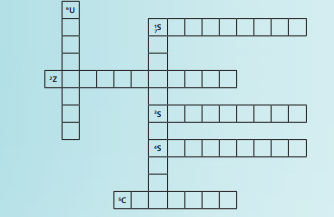
Across 1. A form of transport for carrying people through space
2. The state in which there is no gravity
3. A place where old or unwanted things can be left
4. A machine that has been sent into space and goes around the Earth, Moon, etc.
5. An instrument that shows directions
Down 6. All space, including all the stars and planets
7. The ______ is the Sun and the planets that go around it.
The answer: Across 1. spaceship 2. zero gravity 3. scrapyard 4. satellite 5. compass
Down 6. universe 7. solar system
********************************
Unit 4 /AB
Third section
Communication
Forming a team
Page 33
1 You are in charge of a new space mission that will explore the solar system. Before you can leave, you need to choose the best possible astronaut to join your team. Each astronaut has strong and weak points so make sure you choose the best one to take into space.
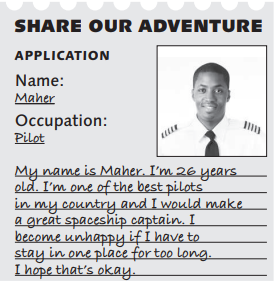
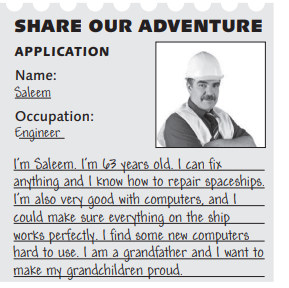
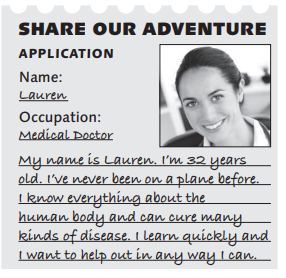
2 Write three sentences in your notebook with the strong and weak points for each candidate. Example: Maher has some strong points. He can pilot a spaceship. However, he can’t stay in one place for long.
3 Use your notes to discuss with a friend who the best candidate is.
4 Write a sentence stating your choice and giving your reasons.
________________________________________________
________________________________________________

The answer:
| Name | Strong points | Strong points |
| Maher | He can pilot a spaceship. | He becomes unhappy if he has to stay in one place for too long. |
| Lauren | She knows everything about the human body and can cure any disease. | She’s never been on a plane before. |
| Saleem | He can repair spaceships. | He fi nds some computers hard to deal with. |
2. Students’ own answers
3. Students discuss
4. Students’ own answers
****************************************************
Fourth Section
Focus on writing Punctuation:
A formal letter In a formal letter, the address, date, salutation (Dear …) and ending all have capital letters. 1 Write this letter again in your notebook with the correct punctuation.
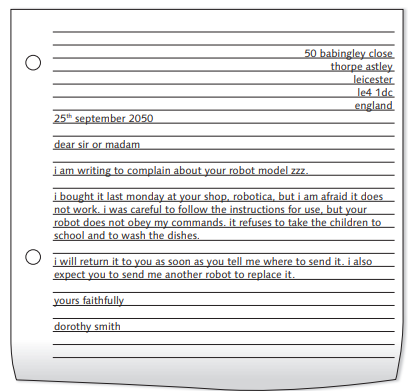
The answer:
50 Babingley Close
Thorpe Astley
Leicester
LE4 1DC
England
25th September, 2050 Dear sir or madam, I am writing to complain about your robot model ZZZ.
I bought it last Monday at your shop, Robotica, but I am afraid it does not work. I was careful to follow the instructions for use, but your robot does not obey my commands. It refuses to take the children to school and to wash the dishes.
I will return it to you as soon as you tell me where to send it. I also expect you to send me another robot to replace it. Yours faithfully, Dorothy Smith.
***********************************************
Spelling / page 35
2 Complete the words with the correct spelling

The answer: 1. planet 2. revolving 3. solar system 4. Earth 5. Astronomers
Exercies 2:
Linking words
3 Rewrite these sentences using first, then and finally. Use the cues to help you.
a. What will the stages for travelling to Mars be? _________ (we/send) a robot to explore the landing site. _________ (it/return) to Earth with a sample of Martian rock and soil and scientists will study this carefully. _____________ (people/ travel to Mars), but not earlier than 2035.
b. When a comet gets close to the sun, ___________ (it/begin) to melt and it will leave behind a beautiful tail. _________ (it/melt) down to a little bit of ice and dust. _________ (it/disappear).
c. Imagine you start a trip from the Sun to the end of the solar system at the age of 10. ___________ (you/find) Mercury. This trip will take you 3 months. ___________ (you/see) Venus, the Earth, Mars, Jupiter, Saturn and Uranus. ___________ (you/reach) Neptune at the age of 56.
The answer:
a. First, we will send / Then, it will return / Finally, people will travel to Mars
b. First it will begin / Then, it will melt / Finally, it will disappear
c. First, you will fi nd / Then you will see / Finally, you will reach
***********************************************
4 Describe two events. In the first case, say what you and your family did on your last holidays. In the second, say what you will do on your next holidays. Use first, then and finally.
The answer: 4. Students’ own answers.
***************************************
AB page 36:
1 Read this text. Then complete with the correct Future Simple form of the verbs in brackets. (2 marks each)
| A trip between the stars (1) ____________ (take) several human generations. How (2) ______ we ________ (manage) this? Well, one possibility is that there (3) ____________ (be) a group of people on the ship living normal lives. This means that those who arrive at the destination planet will be from the same family as the original crew. Do you think this (4) __________ (be) possible soon? However, another option is that computers (5) ____________ (guide) the ship while the crew sleeps. Whatever the case, travelling between the stars will be so difficult and will cost a lot! |
The answer:
1. 1. will take 2. will/manage 3. will be 4. will be 5. will guide
**************************************
2 Look at the information in the table. Then, write five sentences to describe what life would be like on Saturn. (2 marks each)
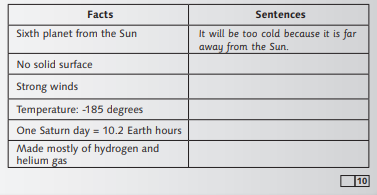
The answer: 2. Students’ own answers
*************************************
3 Choose the correct answer. (2 marks each)
1. What _______?
a. the first people landing on Mars will see b. will the first people landing on Mars see c. the first people landing on Mars see
2. Once you start the trip between the stars, you _______ be able to stop along the way.
a. wont b. want c. won’t
3. Breathing Mars’s atmosphere __________ easy.
a. will not b. will not be c. be not
4. Will tourists _______ special astronaut training in the 25th century?
a. need b. won’t need c. be need
5. When a shuttle is above 100km high, astronauts can float in the air and enjoy _______.
a. spaceships b. satellites c. zero gravity
The answer: 3. 1. b 2. c 3. b 4. a 5.c
**********************************
Lesson 8 / Project
Page 47
|
A Your first assignment • Draw two lines on a large cardboard paper as in the picture above. Then use a compass to draw circles around the centre of the piece of cardboard (which is the point where the two lines meet). The circles are the orbits of the eight planets. Make sure you keep a distance between the Årst four planets and the last four. • Use the sharp point of scissors to make a hole in the centre; this is where the Sun will hang. Then make one hole somewhere on each circle (orbit); a planet will hang from each hole. |
|
B Your second assignment • Cut circles from construction paper to represent the Sun and each of the planets. Refer to the picture of the solar system on page 37 for the different sizes of the planets and the Sun . • Write the name of each planet on the back of its circle with a marker or pencil. • Tape a piece of string to each planet and to the Sun. Through the correct hole in the large cardboard circle, lace the other end of each piece of string. Tape the end of the piece of string to the upper side of the cardboard. • You now have a model of our solar system. You may give a presentation to the class! |